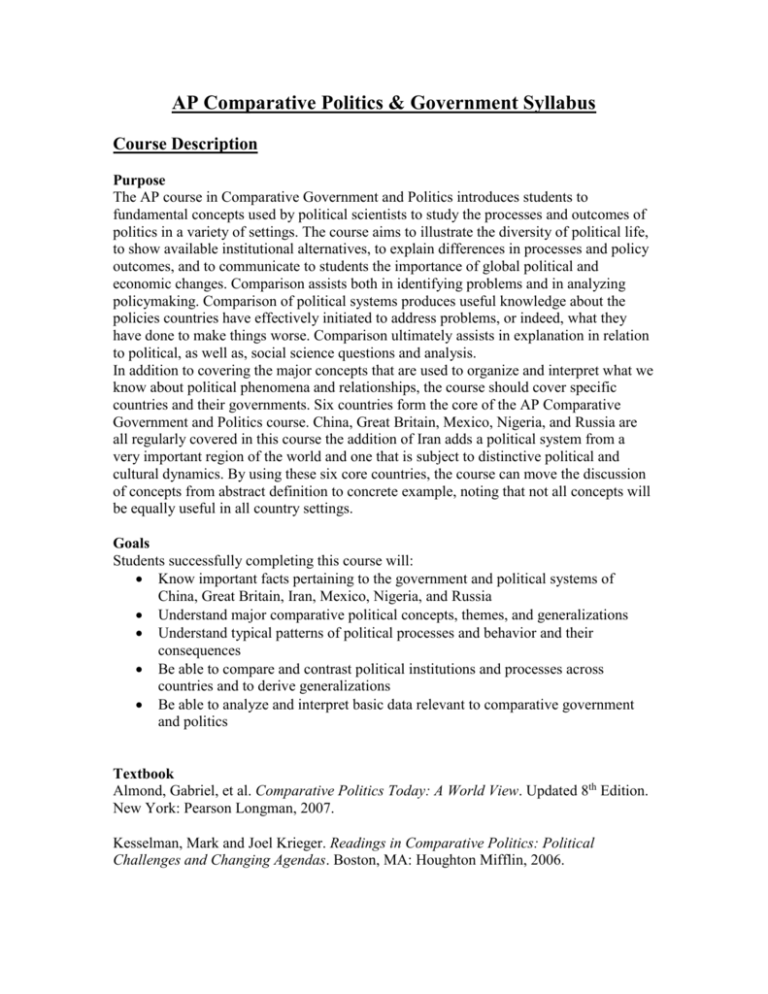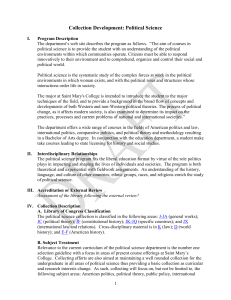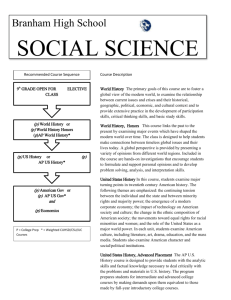
AP Comparative Politics & Government Syllabus
Course Description
Purpose
The AP course in Comparative Government and Politics introduces students to
fundamental concepts used by political scientists to study the processes and outcomes of
politics in a variety of settings. The course aims to illustrate the diversity of political life,
to show available institutional alternatives, to explain differences in processes and policy
outcomes, and to communicate to students the importance of global political and
economic changes. Comparison assists both in identifying problems and in analyzing
policymaking. Comparison of political systems produces useful knowledge about the
policies countries have effectively initiated to address problems, or indeed, what they
have done to make things worse. Comparison ultimately assists in explanation in relation
to political, as well as, social science questions and analysis.
In addition to covering the major concepts that are used to organize and interpret what we
know about political phenomena and relationships, the course should cover specific
countries and their governments. Six countries form the core of the AP Comparative
Government and Politics course. China, Great Britain, Mexico, Nigeria, and Russia are
all regularly covered in this course the addition of Iran adds a political system from a
very important region of the world and one that is subject to distinctive political and
cultural dynamics. By using these six core countries, the course can move the discussion
of concepts from abstract definition to concrete example, noting that not all concepts will
be equally useful in all country settings.
Goals
Students successfully completing this course will:
Know important facts pertaining to the government and political systems of
China, Great Britain, Iran, Mexico, Nigeria, and Russia
Understand major comparative political concepts, themes, and generalizations
Understand typical patterns of political processes and behavior and their
consequences
Be able to compare and contrast political institutions and processes across
countries and to derive generalizations
Be able to analyze and interpret basic data relevant to comparative government
and politics
Textbook
Almond, Gabriel, et al. Comparative Politics Today: A World View. Updated 8th Edition.
New York: Pearson Longman, 2007.
Kesselman, Mark and Joel Krieger. Readings in Comparative Politics: Political
Challenges and Changing Agendas. Boston, MA: Houghton Mifflin, 2006.
Alternate Textbook
Hauss, Charles. Comparative Politics: Domestic Responses to Global Challenges. 5th ed.
Belmont, CA: Thomson-Wadsworth, 2006.
O’Neil, Patrick. Essentials of Comparative Politics. New York: W.W. Norton, 2005.
Supplemental Readings
Soe, Christian, edited. Annual Editions: Comparative Politics 08/09. Guilford, CT:
Dushkin Publishing Group, 2008.
Christian Science Monitor, The Economist, Foreign Affairs, New York Times
Course Outline
I.
Introduction to Comparative Politics
This section will introduce students to the study of politics by explaining
how political scientists study politics and why it is important for students to be
informed about politics abroad. Students will learn to distinguish between
normative, or value-related, questions and empirical or factual questions, and
to emphasize that political scientists are interested in both types of questions.
It will also be made relevant to the students why comparative analysis is
important to political scientists when examining these questions.
II.
Sovereignty, Authority, and Power
The study of politics requires an understanding of power. Comparative
politics examines the sources of power that are the foundation for politics and
the construction of the rules of politics. Constitutions define both the role and
constituent parts of a government and the limits and obligations of
government with respect to the rights of citizens. Studying different types of
political regimes, from forms of democracy to the various non-democratic
forms, enables students to gain a clearer picture of how states strike a balance
between citizen’s rights and government power. The exercise of power
requires justification, and political scientists use the concept of legitimacy to
refer to the popularly accepted use of power by a government. Students must
conceptualize the different ways in which political legitimacy is expressed in
states, as well as recognizing when legitimacy has been lost.
The course should introduce students to the scope and role of government
in the economy. Students also should be familiar with belief systems that
might form the foundation for claims to legitimacy. Students should seek to
understand the basics of the relationship between sources of authority,
political power, and governance.
Political scientists are interested in political culture, core values, and
beliefs, and how these values are fostered and disseminated through the
process of political socialization. Such values are often organized in specific
ideologies that influence the direction of the exercise of power. Students will
be encouraged to explore the differences in political values and beliefs.
III.
Political Institutions
The study of political institutions should include the formal structure and
workings of states and governments. In this introductory course, this means
that students should master knowledge about different authority systems and
government structures. It is important that students are familiar with the
branches of government in the countries they study and understand how these
branches relate to one another. Students will understand different
arrangements of executive power, different legislative structures, and the
different models of executive-legislative relations.
Since politics is both formal and informal, students need to understand
formal constitutional patterns as well as procedures that are more informal. In
this context, comparing institutions in different political and country settings
will be very helpful. Students will understand how political elites are recruited
and how political preferences are aggregated.
IV.
Citizens, Society, and the State
Politics hinges on the interactions between state and society. Through
country cases, students can learn how certain kinds of cleavages such as
ethnicity, religion, or class become politically relevant. A country’s political
patterns depend largely on the characteristics and demands of its population.
Gaining an understanding of civil society both conceptually and within
countries will provide useful tools that will enable students to explore the
ways in which state power is mediated and the power of citizens may be
enhanced. Much of politics is affected by the extent and nature of citizen
organization independent of the state.
Students should consider the relation between the media (in its various
forms) and the state, as well as the ways the media influences and shapes
public perceptions, beliefs, and practices. Students will learn how to define the
concept of political participation, and be able to describe the ways in which
political participation can both support and undermine a political system.
Students will need to grapple with the connection between social movements
and representation – especially since this is often the most basic claim put
forward by social groups demanding the attention of their states.
V.
Political and Economic Change
Much of the cross-case coverage will inevitably deal with processes of
change, since this has been the primary theme of politics in the recent past.
One way students will be introduced to the notion of change is to explore the
interaction between political and economic trends. The countries studied will
provide illustrative examples of this interaction, which can take the form of
political and economic reform, coups d’etat, and revolutions. Students should
be able to distinguish among these types of political and economic change.
Within the context of economic change, the course should address issues such
as corruption and economic inequality.
Globalization has become an increasingly important theme over the last
two decades, especially as national policymaking has been affected by
interdependence. The cultural aspects of globalization also must be examined.
Emergence of a worldwide consumer culture and ideological convergence
among elites of different countries, on the one hand, is balanced by new ethnic
fragmentation and widening class-based cultural cleavages within countries,
on the other. Some attention will be given to the backlashes against
globalization. Students will evaluate how these backlashes bear on themes
such as sovereignty and the ideal of the nation-state. Some responses to
globalization reaffirm the sovereignty of the modern state, while others also
transcend it by taking religious or ethnic identities as a reference point.
VI.
Public Policy
Public policy will require analysis within each country as well as
comparatively. Policy issues need to be approached both as domestic and as
global policy matters, since there are broad and enduring policy areas
common to most countries.
A broad range of factors influences policymaking. First, consideration
must be given to formal and informal institutional influences on
policymaking. Interest groups, political parties, and executive, judicial, and
legislative branches all participate in the creation of policy. For many of the
systems studied, changes in the economic substructure have been the result of
policy changes as well as causal factors in policy development. Second,
development itself results in numerous shifts and alterations in policy
requirements. Third, global pressures are exerted on policymakers in both
developed and developing systems.
Students will be able to discuss and analyze policy differences in a
comparative context, exploring how different systems create solutions to
domestic and global problems.
Throughout the course, students should develop the ability to move back
and forth between conceptualizing political problems and the practice of
politics in the different countries. The emphasis should be on broad trends that
allow comparison, rather than on details that are unrelated to larger trends and
concepts.
COURSE CONTENT
READING
This is a “readings” course, you will do a lot of reading and you will learn a lot of
information. You are responsible for reading at home, in class, and out-loud as a group.
You are responsible for participating in discussions based upon class readings and you
will often receive a grade based upon your level or degree of participation.
Critical/Analytical Essays
Students will prepare essays that involve data interpretation and analysis of each
“country” as well as themes consistent with the curriculum for Comparative Politics. The
essays will be turned in on specified days and graded by the instructor with full feedback
provided. Certain essay topics will be discussed in class in a Socratic seminar format
please be prepared to elaborate with your classmates on your individual essays.
Daily/Weekly Quizzes
Will be given at the beginning of class and graded within the class period. They will
usually be no more than five short answer questions. These questions will be based on the
reading assigned for homework or vocabulary terms.
Quarterly Exam
There will be a quarterly test given one week before the end of each quarter. It will be in
the AP format with 50-60 multiple-choice questions and short answer/essay questions.
This test will count for approximately 25% of your quarter grade.
Unit Exams
Unit Exams will be given after certain chapters or a combination of chapters that are
covered in class. The format will be multiple-choice and short answer, depending upon
the chapter’s content. They will follow the format of the AP Comparative Politics Exam.
Critical Book Reviews & Analysis
This assignment will involve reading designated books related to the core countries in the
AP Comparative class. Further details will be given at a later date.
Current Events
Students will do six current events per quarter, one for each of the six major countries of
focus. You will be required to use the academic periodicals listed in “Supplemental
Readings” to acquire the necessary articles for the current events. More details on how to
do current events will be given in the first week of class.
Group Projects
Students will be assigned within the first week of class to a group that will represent one
of the six major countries of focus in this class: Great Britain, China, Nigeria, Iran,
Mexico, and Russia. Students will complete current events, compile data, and take part in
a major presentation on the country to which group they have been assigned.
Notes/Index Cards
EVERYONE takes notes on EVERYTHING, including lectures, discussions,
presentations, and outside research. It is important to review your class notes on a daily
basis so they remain fresh in your mind. Index cards will be completed for specific
chapters or units and given a grade of “A, C, or F” depending on the quality of the work.
Extra Credit
Students can receive extra credit for preparing a power point presentation and activity on
one of the optional countries: Germany, France, Japan, India, Brazil, Iraq, Egypt, and
Saudi Arabia. These can be done at the specific times stated on the syllabus.
Assignments
All assignments are due on the date specified, LATE WORK WILL NOT BE
ACCEPTED. If you have an excused absence you have one class period to make up
work after an admit has been shown to the teacher.
SCOPE & SEQUENCE
1st QUARTER
CHAPTER 1 Issues in Comparative Politics
What is Politics?
Governments
Political Systems
States
Development
Democracy, Human Rights, and Civil Liberties
Read pgs.1-29, Article, “Clash of Civilizations” Samuel Huntington; Video:
“Comparative Politics”
CHAPTER 2 Comparing Political Systems
Why we compare? How we compare?
Systems: Structure and Function
Read pgs.31-44, Article “Presidents and Prime Ministers”
CHAPTER 3 Political Culture and Political Socialization
Political Culture
Three Levels of Political Culture
Political Socialization
Agents of Political Socialization
Contemporary Political Cultures
Read pgs.46-60, Article “Cultural Explanations: The Man in the Baghdad
Café”
CHAPTER 4 Interest Articulation
Citizen Action
Interest Groups
Access to the Influential
Policy Perspectives on Interest Articulation
Read pgs.62-78, Article “Elite Transformation and Institutional Change:
Recent Party Congresses in China”
CHAPTER 5 Interest Aggregation and Political Parties
Personal Interest
Institutional Interest
Competitive Party Systems and Interest Aggregation
Authoritarian Party Systems
Military and Interest Aggregation
Trends and Significance in Interest Aggregation
Read pgs.81-98, Article “Electoral Systems and Political Parties”
CHAPTER 6 Government and Policymaking
Constitutions and Decision Rules
Democracy and Authoritarianism
Geographic Distribution of Power
Separation of Government Powers
Limits on Government Powers
Assemblies
Political Executives
The Bureaucracy
Elite Recruitment
Control of Elites
Read pgs.101-126, Reading, “Democracy and Authoritarianism”, Article
“Islam and Authoritarianism”; Movie: “V for Vendetta”
2nd QUARTER
CHAPTER 7 Public Policy
Government and What it Does
Extraction
Distribution
Regulation
Community-Building and Symbolic Policies
Domestic Welfare
Domestic Security Outcomes
International Outputs and Outcomes
Political Goods and Values
Strategies for Producing Political Goods
Trade-off and Opportunity Costs
Read pgs.129-154, Article “Toward Democratic Consolidation” Larry
Diamond; Article “Economic Growth and Income Inequality” Simone
Kuznets
CHAPTER 13 Politics in the US
Historical/Cultural
Political History
Government Structure
Public Response
Political Change
Read pgs.411-451
CHAPTER 8 Politics in the United Kingdom
Historical/Cultural
Political History
Government Structure
Public Response
Political Change
Read pgs.157-202, Article “The British General Election of 2005”, Article “A
Constitutional Revolution in Britain” Donley Studlar
CHAPTER 12 Politics in Russia
Historical/Cultural
Political History
Government Structure
Public Response
Political Change
Read pgs.363-406, Article “Illiberal Democracy and Vladimir Putin’s
Russia” Article “Russia’s Elections and ‘Managed Democracy’”
(France, Germany, Japan) Optional – Extra Credit
3rd QUARTER
CHAPTER 9 Politics in China
Historical/Cultural
Political History
Government Structure
Public Response
Political Change
Read pgs.207-249, Article “Two Chinas” NYT, Reading “China and the
Falun Gong Crisis, 1999-2000” Article “China: the Quiet Revolution” Doug
Guthrie
CHAPTER 14 Politics in Iran
Historical/Cultural
Political History
Government Structure
Public Response
Political Change
Read pgs.457-498, Article “Jihad vs. McWorld” Benjamin Barber, Article
“Iran and the Coming of the Nuclear Age”
CHAPTER 10 Politics in Mexico
Historical/Cultural
Political History
Government Structure
Public Response
Political Change
Read pgs.255-305, O’Neil, “Less Developed and Newly Industrializing
Countries” Chpt.9, Article “Maquiladoras and Environmental Degradation
in Mexico” Washington Post
CHAPTER 11 Politics in Nigeria
Historical/Cultural
Political History
Government Structure
Public Response
Political Change
Read pgs.311-358, Article “The Democratic Transition in Nigeria”, Reading
“Nigeria and Shari’a”
(India, Brazil, Canada, Iraq) Optional-Extra Credit
4th QUARTER – Review
REVIEW FOR AP EXAM
Free Response Packet
Review of Major Themes
Country Presentations
Graph, Map, & Statistical Analysis Review
Review Handouts
Mock Exams
AP EXAM: Monday, May 3rd, 2010
WE ARE DONE!!!!!










